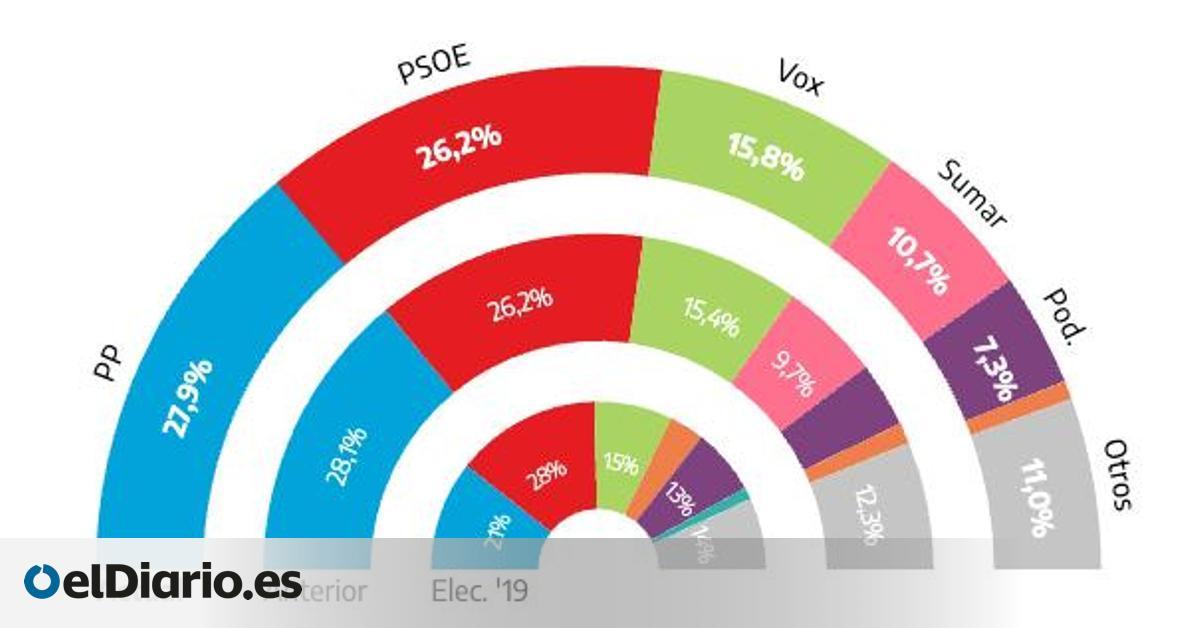
The elections on May 28 will shape the regional and municipal power and, in addition, will open the next electoral stage this year, which will lead to the general elections in December. Before next Sunday’s results impact the expectations of the matches at the national level, the competition for first place between PSOE and PP remains at less than two points with little change compared to April, while Sumar and Podemos push from below.
The CIS leaves few options for the PP to seize regional governments from the PSOE
Further
The rise of the two formations to the left of the PSOE is the most relevant aspect of the latest poll before the elections, prepared by Simple Lógica for elDiario.es. In the second month in which Sumar joins the estimates, Yolanda Díaz’s formation adds one more point, the same as Podemos, whose projection has also changed by no longer including the confluences with which it was presented in 2019 .
The electoral photo of May presents few changes in the two parties that are in the lead. If general elections were held now, the PP would win with 27.9% of the votes. They are two tenths less than a month ago, but it represents a slowdown in the decline that it had been experiencing since February. Those of Alberto Núñez Feijóo are still well above the results of 2019, but they are five points below their best estimates.
The PSOE remains unchanged. The vote estimate is exactly the same as a month ago, 26.2%. The Socialists also manage to stop the downward decline of the last three months, which has led them to move far away from their best results and even to be below those achieved in 2019, when they obtained 28% of the votes. With these data, the difference between the two parties remains at 1.7 points, two tenths less than a month ago.
Behind them is Vox, which this month drags four tenths more to its voting intention. The far-right formation would obtain 15.8% in general elections, after having recovered little by little in recent months. Santiago Abascal’s party rose to 18% but sank at the beginning of the year, and since then it has added a few tenths every month to stand above 15.3% in the last general elections.
Sumar y Podemos, on the rise
After its irruption in April, when the candidacy of Yolanda Díaz was officially presented, Sumar has managed to scratch one more point in vote estimation: from 9.7 to 10.7%. Podemos also goes up one point and remains at 7.3% of the votes.
The sum of both parties is much higher than the data obtained by the United We Can coalition. Between the two they manage to unite 18% of the votes, above the best estimates of United We Can, which barely exceeded 12%.
Simple Lógica has incorporated Sumar and differentiates it from Podemos because both formations have not yet reached an agreement to run jointly in the elections. Meanwhile, the arches and tables have gone from referring to Unidas Podemos –the name of the confluence that brought together several parties in the 2019 elections– to refer only to Podemos, because some of its partners until now –such as IU or En Comú – have already announced their incorporation to Sumar. The evolution of Unidas Podemos in the estimate was cut last April and a new one began, like Podemos, because otherwise it would reflect a decrease that could be misleading.
Sumar draws mainly from former United Podemos voters, either because they voted for one of the formations that are now allies of Díaz or because in 2019 they voted for Podemos and now they will vote for Sumar. It takes almost 30% of those voters although it also fishes in the PSOE fishing ground, which sees how 7% of its voters would now opt for the Minister of Labor.
The PP is the one that retains its 2019 electorate the most and grows thanks to a huge transfer of votes from Ciudadanos (which would not obtain representation in Congress) and 17.4% of former Vox voters.
With these data, the fight between the left and right blocks is only played in a few tenths. The parties to the left of the PSOE have compensated for their fall in recent months to add 44.2% of the votes, while on the right, the decline of the PP and the virtual disappearance of Ciudadanos leave them with 44.9%. .
Díaz wins, but Feijóo, Belarra and Abascal come back
Regarding the evaluation of leaders, the Second Vice President and Minister of Labor, Yolanda Díaz, remains the politician that obtains the best positive evaluation, although this month it has fallen a few tenths to stand at 39.7%, above the Prime Minister, Pedro Sánchez, who also falls and remains with a positive assessment of 36.3%.
In third place remains Íñigo Errejón, leader of Más País, with 33.6%, followed by Feijóo. The president of the PP has come back more than four points this last month to reach a positive assessment of 25.7% and place himself above the leader of the IU, Alberto Garzón (24.6%).
Their data also improve this month for the president of Vox, Santiago Abascal, who rises to 17.1% and the general secretary of Podemos, Ione Belarra, who adds two points to stay with 14.3%.
Source: www.eldiario.es

